In the realm of vehicle recovery and roadside assistance, towing plays a critical role in keeping roadways safe and clear. Whether you’ve experienced a breakdown, a collision, or an unexpected mechanical failure, the right towing service can provide prompt and reliable assistance when you need it most.
However, not all towing services are created equal. Each type of towing is designed to suit different circumstances, vehicle types, and emergency scenarios. Understanding the range of towing services available in Australia ensures you can make informed decisions during stressful and potentially hazardous situations.
1. Emergency Towing Services
Emergency towing is the most commonly recognised form of assistance. These services are typically requested following an accident or a sudden vehicle failure that renders a car immobile. Emergency towing providers operate around the clock and are equipped to handle a wide range of vehicle types and emergency conditions. Whether you’re stuck on a remote highway or in the middle of peak-hour traffic, emergency tow operators respond quickly to remove the vehicle from the road and transport it to a mechanic or holding yard. These professionals are also often trained in roadside safety protocols, ensuring the protection of both the vehicle owner and other road users.
Emergency towing is particularly vital in metropolitan areas, where traffic congestion and rapid response times are critical. In rural and regional settings, emergency towing often involves covering long distances, which requires a fleet capable of handling extended hauls. Regardless of location, this service provides peace of mind when vehicle failure occurs without warning.
2. Flatbed Towing
Flatbed towing, also referred to as tilt tray towing, is one of the safest methods for transporting vehicles, particularly those with significant damage or specialty vehicles like classic cars, performance vehicles, or motorcycles. In this process, the entire vehicle is lifted onto a flat platform, preventing further wear and tear during transit. It also eliminates the risk of damage to the drivetrain, tyres, or undercarriage, which can occur with more traditional tow methods.
This type of towing is preferred for high-value or all-wheel-drive vehicles because all wheels are off the ground, reducing mechanical stress. It’s also ideal for transporting vehicles over long distances or through uneven terrain. Many towing companies in Australia rely on flatbed trucks for their versatility and ability to handle various scenarios, from breakdown recovery to vehicle relocation.
3. Heavy-Duty Towing
Heavy-duty towing is essential for commercial fleets, buses, construction equipment, and large trucks. This specialised service requires larger tow trucks, reinforced towing equipment, and experienced operators. Unlike standard car towing, heavy-duty jobs involve unique considerations such as weight distribution, safety locking mechanisms, and the correct attachment points for non-standard vehicles.
Heavy-duty tow operators are often called out to accident scenes involving large commercial transport or industrial vehicles. They may also be engaged in recovery efforts where a large vehicle has become stuck in mud, sand, or other difficult terrain. These operators typically undergo extensive training and certification to safely manage complex towing tasks involving oversized loads.
In Australia, industries such as mining, agriculture, and freight heavily rely on heavy-duty towing. Having access to this service ensures minimal disruption to business operations when large vehicles encounter problems.
4. Long-Distance Towing
Long-distance towing services are designed for situations where a vehicle needs to be transported across considerable distances, such as interstate relocations or when purchasing a vehicle from another part of the country. Unlike local towing, long-distance jobs require coordination, planning, and the ability to safely transport a vehicle over hundreds or even thousands of kilometres.
Australian drivers often rely on long-distance towing when relocating between states or during extended holidays in remote locations. The service offers a practical solution for avoiding wear and tear on the vehicle from long drives, while ensuring it arrives safely at its destination. Additionally, car dealerships, auction houses, and vehicle transport companies frequently utilise long-distance towing as part of their logistical operations.
5. Motorcycle Towing
Motorcycle towing is a specialised service tailored specifically for two-wheeled vehicles. Unlike standard cars or trucks, motorcycles require delicate handling and custom securing systems to prevent tipping or damage during transport. Many towing companies in Australia now offer motorcycle-specific trailers or flatbeds with soft straps and wheel cradles to ensure safe transport.
Motorcycle towing is especially important for riders who experience breakdowns on open roads where repair options are limited. Given the growing popularity of motorcycles for both commuting and recreation across the country, having access to towing services that cater to this niche is increasingly important. Towing operators trained in motorcycle handling can provide faster, safer service for bike owners and minimise the risk of damage during recovery.
In Australia, towing is a diverse and highly responsive industry that supports both everyday motorists and commercial operations. From emergency roadside rescues to transporting high-value vehicles or heavy equipment, understanding the different types of towing services can help you respond effectively when the unexpected happens. Each service—from flatbed to motorcycle towing—caters to specific needs and ensures vehicles are moved safely and efficiently.
Choosing the right type of towing not only prevents additional vehicle damage but also provides reassurance in high-stress situations. Whether you’re a car enthusiast, a truck driver, or a motorcyclist, having a reliable towing service on hand means you’re never truly stranded. By familiarising yourself with the five primary types of towing, you’ll be better prepared for whatever the road throws your way.




